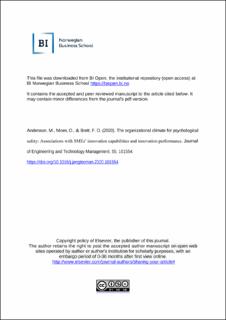The organizational climate for psychological safety: Associations with SMEs' innovation capabilities and innovation performance
Journal article, Peer reviewed
Accepted version
Permanent lenke
https://hdl.handle.net/11250/2992481Utgivelsesdato
2020Metadata
Vis full innførselSamlinger
- Scientific articles [2181]
Originalversjon
Journal of Engineering and Technology Management Volume 55, January–March 2020, 101554 10.1016/j.jengtecman.2020.101554Sammendrag
This paper conceptualizes psychological safety as an organizational level phenomenon, andproposes that an organizational climate for psychological safety is positively related to SMEs'innovation performance and innovation capabilities. These hypotheses are tested on data fromNorwegian SMEs. The results demonstrate that psychological safety is positively associated withSMEs' innovation performance, and positively related to product-, process-, service-, and businessmodel innovation capabilities. Furthermore, an organizational climate for psychological safety isparticularly important for enhancing afirm’s radical innovative capability, while environmentaldynamism is found to moderate the effect of psychological safety. The results support the re-levance of psychological safety at thefirm level of analysis.
Utgiver
ElsevierTidsskrift
Journal of engineering and technology managementOpphavsrett
Elsevier
Med mindre annet er angitt, så er denne innførselen lisensiert som Attribution-NonCommercial-NoDerivatives 4.0 Internasjonal
Beslektede innførsler
Viser innførsler beslektet ved tittel, forfatter og emneord.
-
- How strong is AvantGarde Search ability to innovate- And how can innovation capabilities defined by the methodology “scalable learning” affect the company's ability to innovate in a rapidly changing environment?
Hansen, Kennet Altamiranda; Kvalstad, Kine (Master thesis, 2022)Efficiency, Key Performance Indicators and incentives for performance, measured towards successfully solving assignments and contracts given by customers, leaves little time and interest for taking a step back and preparing ... -
The contrary forces of innovation: a conceptual model for studying networked innovation processes
Hoholm, Thomas; Olsen, Per Ingvar (Journal article; Peer reviewed, 2012)In this paper, we argue that industrial innovation processes can productively be analyzed as consisting of two sub-processes that over time create and mobilize contrary forces within both internal and external interactions ... -
The Contrary Forces of Innovation: An Ethnography of Innovation Processes in the Food Industry
Hoholm, Thomas (Series of Dissertations, Doctoral thesis, 2009)The purpose of the study is to contribute to our understanding of innovation processes. The overarching research question has been: How do innovation processes evolve over time, and, in particular, how are knowledge and ...

